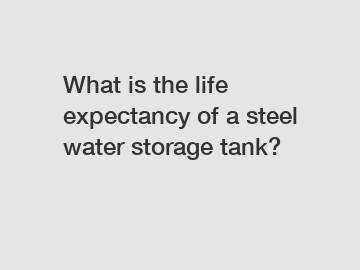Apr. 06, 2024
Agriculture
Longzhuo contains other products and information you need, so please check it out.
Steel water storage tanks are commonly used in various industries and households for storing water. These tanks are known for their durability and strength, but many people wonder about the life expectancy of a steel water storage tank. In this blog, we will delve into this topic and explore the factors that can affect the lifespan of a steel tank.
Steel water storage tanks are built to last, with a typical life expectancy ranging from 20 to 30 years. However, this can vary depending on several factors, such as the quality of the steel used, the environment in which the tank is located, and how well the tank is maintained.

One of the most important factors that determines the lifespan of a steel water storage tank is the quality of the steel used in its construction. High-quality steel can withstand corrosion and rust better than lower-quality steel, which can significantly extend the tank's lifespan. It's important to choose a reputable manufacturer that uses high-quality materials to ensure the longevity of your tank.
The environment in which the tank is located also plays a key role in determining its lifespan. If the tank is exposed to harsh weather conditions, such as extreme temperatures or high levels of humidity, it can degrade faster and require more frequent maintenance. Additionally, if the tank is located in an area with high levels of industrial pollution or corrosive chemicals, it may deteriorate more quickly.
Proper maintenance is essential for extending the life expectancy of a steel water storage tank. Regular inspections, cleaning, and repairs can prevent corrosion and rust from developing, which can weaken the tank and lead to leaks or other issues. It's important to follow the manufacturer's guidelines for maintenance and conduct routine checks to ensure the tank is in good condition.
Another factor that can affect the lifespan of a steel water storage tank is the presence of sediment or debris in the tank. Over time, sediment can build up at the bottom of the tank, which can promote corrosion and reduce the tank's capacity. Regular cleaning and flushing of the tank can help prevent sediment buildup and prolong the tank's lifespan.
In addition to these factors, the design and construction of the tank can also impact its life expectancy. Tanks that are properly designed and constructed with features such as protective coatings, cathodic protection systems, and adequate ventilation are more likely to have a longer lifespan than tanks that lack these safeguards.
While steel water storage tanks are built to last, it's important to be aware of the factors that can affect their lifespan and take steps to ensure they remain in good condition. By choosing high-quality materials, maintaining the tank regularly, and following best practices for storage and usage, you can maximize the lifespan of your steel water storage tank and enjoy reliable water storage for years to come.
In conclusion, the life expectancy of a steel water storage tank can vary depending on factors such as the quality of the steel used, the environment in which the tank is located, and how well it is maintained. By choosing a reputable manufacturer, conducting regular maintenance, and keeping the tank clean and free of sediment, you can extend the lifespan of your tank and ensure reliable water storage for years to come.
If you want to learn more, please visit our website inclined plate packing product.
If you are interested in sending in a Guest Blogger Submission,welcome to write for us!
All Comments ( 0 )